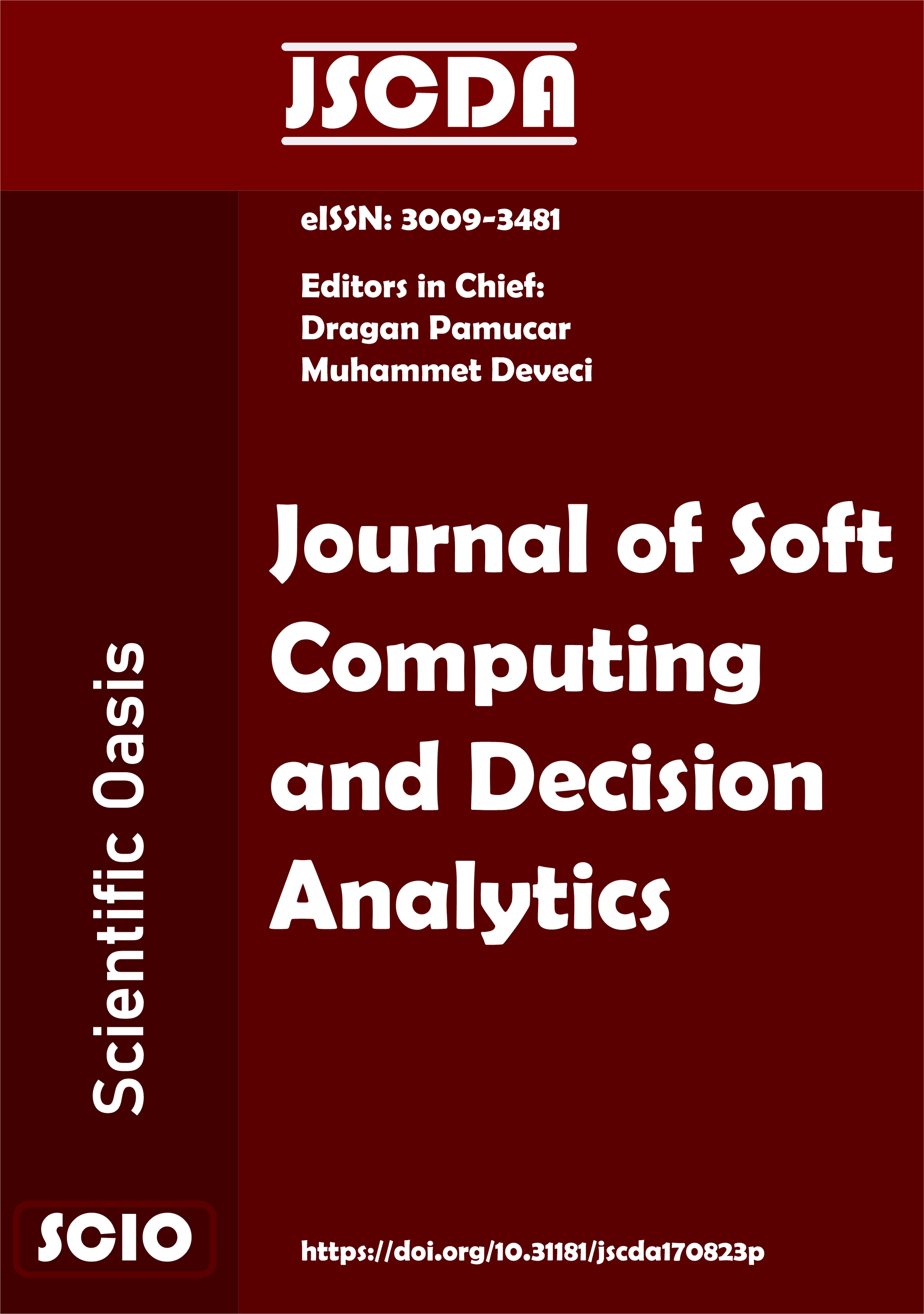Examining the Mediating Effect of Knowledge Management on the Relationship Between Organizational Culture and Organizational Performance
DOI:
https://doi.org/10.31181/jscda1120235Keywords:
Organizational culture, Organizational Performance, Knowledge Management, PLS, SEMAbstract
Nowadays, organizations with international dimensions are surrounded by fierce competition and extreme, unstable environments. With these hostile conditions, only those organizations that demonstrate better performances in comparison to their rivals can survive. They can outperform their rivals regarding financial, procedural, and internal operations. To this aim, two variables, organizational culture, and knowledge management, play crucial roles. On the one hand, organizational performance hinges on the in-depth storage of experience, creation, and classification of knowledge. On the other hand, they are under the impression of social and cultural variables of the organization. Among these items, knowledge management is also under the influence of organizational culture and is capable of taking a mediatory role in organizational culture performance. Thus, this research is aimed at exploring the mediatory role of knowledge management in the relationship between organizational culture and performance. Simultaneously exploring these two factors can give new insight into organizational performance under the social and knowledge variables and extend the literature in this area. To this end, each of the three factors was investigated through library study and defined as factorial constructs. Afterward, their relationship was modeled, and the model was under effect in Etehad Rah Engineering Advisory Company as the research’s Statistical Society. A simple random method was used; 28 persons constitute the research’s participants. A questionnaire and PLS software were used to collect and analyze the data. The results reveal a positive and significant relationship between organizational performance and culture directly and through knowledge management. Moreover, a positive and significant correlation exists between organizational performance and knowledge management and organizational culture and knowledge management.
Downloads
References
Homburg, C., & Pflesser, C. (2000). A multiple-layer model of market-oriented organizational culture: Measurement issues and performance outcomes. Journal of marketing research, 37(4), 449-462. https://doi.org/10.1509/jmkr.37.4.449.18786.
O'Reilly III, C. A., Chatman, J., & Caldwell, D. F. (1991). People and organizational culture: A profile comparison approach to assessing person-organization fit. Academy of management journal, 34(3), 487-516. https://doi.org/10.5465/256404
Huey Yiing, L., & Zaman Bin Ahmad, K. (2009). The moderating effects of organizational culture on the relationships between leadership behaviour and organizational commitment and between organizational commitment and job satisfaction and performance. Leadership & Organization Development Journal, 30(1), 53-86. https://doi.org/10.1108/01437730910927106
Haseli, G., Ranjbarzadeh, R., Hajiaghaei-Keshteli, M., Ghoushchi, S. J., Hasani, A., Deveci, M., & Ding, W. (2023). HECON: Weight assessment of the product loyalty criteria considering the customer decision's halo effect using the convolutional neural networks. Information Sciences, 623, 184-205. https://doi.org/10.1016/j.ins.2022.12.027.
Lee, H., & Choi, B. (2003). Knowledge management enablers, processes, and organizational performance: An integrative view and empirical examination. Journal of management information systems, 20(1), 179-228. https://doi.org/10.1080/07421222.2003.11045756.
Acar, A. Z., & Acar, P. (2014). Organizational culture types and their effects on organizational performance in Turkish hospitals. EMAJ: Emerging Markets Journal, 3(3), 18-31. https://doi.org/10.5195/emaj.2014.47.
Ahmed, M., & Shafiq, S. (2014). The impact of organizational culture on organizational performance: A case study of telecom sector. Global journal of management and business research, 14(3), 21-30
Elenkov, D. S. (2002). Effects of leadership on organizational performance in Russian companies. Journal of business research, 55(6), 467-480. https://doi.org/10.1016/S0148-2963(00)00174-0
Shafi, M., Lei, Z., Song, X., & Sarker, M. N. I. (2020). The effects of transformational leadership on employee creativity: Moderating role of intrinsic motivation. Asia Pacific Management Review, 25(3), 166-176. https://doi.org/10.1016/j.apmrv.2019.12.002
Sahibzada, U. F., Jianfeng, C., Latif, K. F., Shafait, Z., & Sahibzada, H. F. (2022). Interpreting the impact of knowledge management processes on organizational performance in Chinese higher education: mediating role of knowledge worker productivity. Studies in Higher Education, 47(4), 713-730. https://doi.org/10.1080/03075079.2020.1793930.
Cheung, S. O., Wong, P. S., & Lam, A. L. (2012). An investigation of the relationship between organizational culture and the performance of construction organizations. Journal of Business Economics and Management, 13(4), 688-704. https://doi.org/10.3846/16111699.2011.620157.
Leithy, W. E. (2017). Organizational culture and organizational performance. International Journal of Economics & Management Sciences, 6(42), 1-10. http://dx.doi.org/10.4172/2162-6359.1000442.
Abbas, J. (2020). Impact of total quality management on corporate sustainability through the mediating effect of knowledge management. Journal of Cleaner Production, 244, 118806. https://doi.org/10.1016/j.jclepro.2019.118806.
Abane, J. A., & Brenya, E. (2021). The relationship between organizational environment antecedents and performance management in local government: evidence from Ghana. Future Business Journal, 7, 1-17. https://doi.org/10.1186/s43093-020-00049-2.
Gholami, M. H., Asli, M. N., Nazari-Shirkouhi, S., & Noruzy, A. (2013). Investigating the influence of knowledge management practices on organizational performance: an empirical study. Acta Polytechnica Hungarica, 10(2), 205-216. http://dx.doi.org/10.12700/APH.10.02.2013.2.14.
Kalling, T. (2003). Knowledge management and the occasional links with performance. Journal of knowledge management, 7(3), 67-81. https://doi.org/10.1108/13673270310485631.
Zack, M., McKeen, J., & Singh, S. (2009). Knowledge management and organizational performance: an exploratory analysis. Journal of knowledge management, 13(6), 392-409. https://doi.org/10.1108/13673270910997088.
Upadhyay, P., & Kumar, A. (2020). The intermediating role of organizational culture and internal analytical knowledge between the capability of big data analytics and a firm’s performance. International Journal of Information Management, 52, 102100. https://doi.org/10.1016/j.ijinfomgt.2020.102100.
Mills, A. M., & Smith, T. A. (2011). Knowledge management and organizational performance: a decomposed view. Journal of knowledge management, 15(1), 156-171. https://doi.org/10.1108/13673271111108756.
Akhavan, P., Ramezan, M., Yazdi Moghaddam, J., & Mehralian, G. (2014). Exploring the relationship between ethics, knowledge creation and organizational performance: Case study of a knowledge-based organization. VINE: The journal of information and knowledge management systems, 44(1), 42-58. https://doi.org/10.1108/VINE-02-2013-0009.
Gürlek, M., & Cemberci, M. (2020). Understanding the relationships among knowledge-oriented leadership, knowledge management capacity, innovation performance and organizational performance: A serial mediation analysis. Kybernetes, 49(11), 2819-2846. https://doi.org/10.1108/K-09-2019-0632.
Pellegrini, M. M., Ciampi, F., Marzi, G., & Orlando, B. (2020). The relationship between knowledge management and leadership: mapping the field and providing future research avenues. Journal of Knowledge Management, 24(6), 1445-1492. https://doi.org/10.1108/JKM-01-2020-0034.
Rašula, J., Bosilj Vukšić, V., & Indihar Štemberger, M. (2012). The impact of knowledge management on organisational performance. Economic and business review, 14(2), 3. https://doi.org/10.15458/2335-4216.1207.
Noruzy, A., Dalfard, V. M., Azhdari, B., Nazari-Shirkouhi, S., & Rezazadeh, A. (2013). Relations between transformational leadership, organizational learning, knowledge management, organizational innovation, and organizational performance: an empirical investigation of manufacturing firms. The International Journal of Advanced Manufacturing Technology, 64, 1073-1085. https://doi.org/10.1007/s00170-012-4038-y.
Nawaz, M. S., & Shaukat, S. (2014). Impact of knowledge management practices on firm performance: Testing the mediation role of innovation in the manufacturing sector of Pakistan. Pakistan Journal of Commerce and Social Sciences (PJCSS), 8(1), 99-111.
Chen, L., Li, T., & Zhang, T. (2021). Supply chain leadership and firm performance: A meta-analysis. International Journal of Production Economics, 235, 108082. https://doi.org/10.1016/j.ijpe.2021.108082.
Shahzad, M., Qu, Y., Zafar, A. U., Rehman, S. U., & Islam, T. (2020). Exploring the influence of knowledge management process on corporate sustainable performance through green innovation. Journal of Knowledge Management, 24(9), 2079-2106. https://doi.org/10.1108/JKM-11-2019-0624.
Obeso, M., Hernández-Linares, R., López-Fernández, M. C., & Serrano-Bedia, A. M. (2020). Knowledge management processes and organizational performance: the mediating role of organizational learning. Journal of Knowledge Management, 24(8), 1859-1880. https://doi.org/10.1108/JKM-10-2019-0553.
Dos‐Santos, S. M. (2021). Relationship between innovativeness and competitiveness in networked organizations: A perspective from the electric and electronic industry in Brazil. Creativity and Innovation Management, 30(2), 248-267. https://doi.org/10.1111/caim.12433.
Hughes, D. J., Lee, A., Tian, A. W., Newman, A., & Legood, A. (2018). Leadership, creativity, and innovation: A critical review and practical recommendations. The Leadership Quarterly, 29(5), 549-569. https://doi.org/10.1016/j.leaqua.2018.03.001.
Attia, A., & Essam Eldin, I. (2018). Organizational learning, knowledge management capability and supply chain management practices in the Saudi food industry. Journal of Knowledge Management, 22(6), 1217-1242. https://doi.org/10.1108/JKM-09-2017-0409.
Nazarian-Jashnabadi, J., Bonab, S. R., Haseli, G., Tomaskova, H., & Hajiaghaei-Keshteli, M. (2023). A dynamic expert system to increase patient satisfaction with an integrated approach of system dynamics, ISM, and ANP methods. Expert Systems with Applications, 234, 121010. https://doi.org/10.1016/j.eswa.2023.121010.
Quinn, R. E. (2011). Diagnosing and changing organizational culture: Based on the competing values framework. Jossey-Bass.
Mahdavi Mazdeh, M., & Hesamamiri, R. (2014). Knowledge management reliability and its impact on organizational performance: An empirical study. Program, 48(2), 102-126. https://doi.org/10.1108/PROG-01-2013-0001.
Hair Jr, J., Hair Jr, J. F., Hult, G. T. M., Ringle, C. M., & Sarstedt, M. (2021). A primer on partial least squares structural equation modeling (PLS-SEM). Sage publications.
Haseli, G., & Sheikh, R. (2022). Base-criterion method (BCM). Multiple criteria decision making: techniques, analysis and applications. Springer. https://doi. org/10, 1007, 978-981.
Haseli, G., Sheikh, R., & Sana, S. S. (2020). Base-criterion on multi-criteria decision-making method and its applications. International journal of management science and engineering management, 15(2), 79-88. https://doi.org/10.1080/17509653.2019.1633964.
Whittaker, T. A., & Schumacker, R. E. (2022). A beginner's guide to structural equation modeling. Routledge.
Fornell, C., & Larcker, D. F. (1981). Evaluating structural equation models with unobservable variables and measurement error. Journal of marketing research, 18(1), 39-50. https://doi.org/10.1177/002224378101800104.
Wetzels, M., Odekerken-Schröder, G., & Van Oppen, C. (2009). Using PLS path modeling for assessing hierarchical construct models: Guidelines and empirical illustration. MIS quarterly, 177-195. https://doi.org/10.2307/20650284.
Downloads
Published
Issue
Section
License
Copyright (c) 2023 CC Attribution-NonCommercial-NoDerivatives 4.0

This work is licensed under a Creative Commons Attribution-NonCommercial-NoDerivatives 4.0 International License.
















